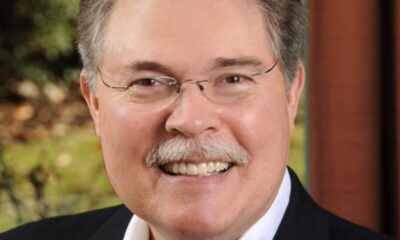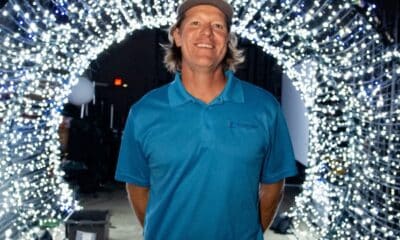Business
10 Years of Peachtree Corners Business Association Scholarship Winners
Published
2 years agoon
Students that Benefited through the Peachtree Corners Business Association Program
Recently, the Peachtree Corners Business Association (PCBA) reviewed its Community Outreach Program results over the past 10 years. The organization decided to follow up with its 15 scholarship winners to find out “where are they now.”
When the PCBA started its scholarship program, it could fund only one scholarship per year. Through the generosity and support of the group’s members and sponsors, it has been able to award two scholarships a year since 2017.
Jenna McEachen
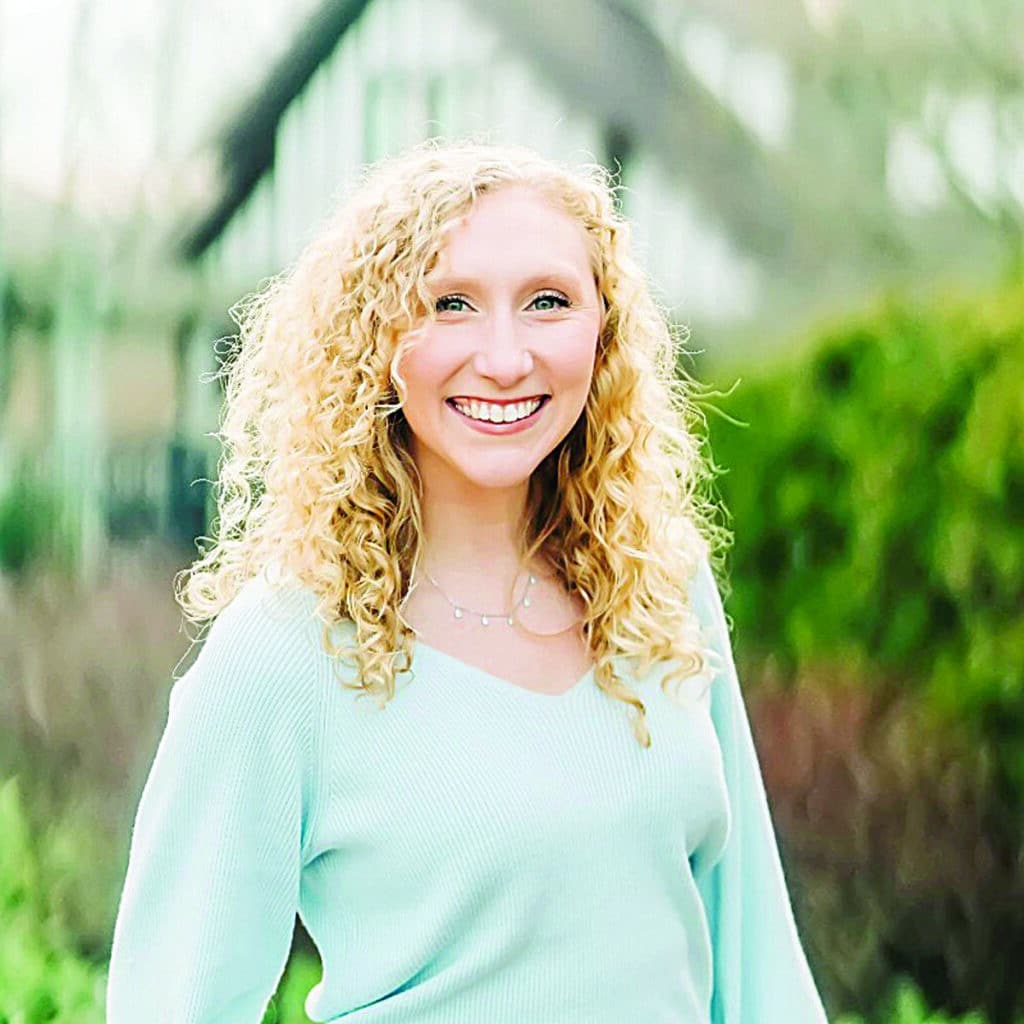
Jenna McEachen was the PCBA’s first scholarship winner. She received her International Baccalaureate Diploma from Norcross High School in 2014. Jenna attended Birmingham-Southern College and graduated in 2018 with a degree in Psychology and Business.
She enjoyed working several internships during her college years, including local business, NanoLumens and an international internship as a programing intern in London, England. She has worked for AT&T for the last 4+ years and is now a Lead Technical Project Manager in the Atlanta area.
Jenna loves building relationships and transforming complex and overwhelming concepts into streamlined and effective communications. She won the AT&T Business Sales Diamond Club Award in 2020 for her outstanding accomplishments.
Elizabeth Waid
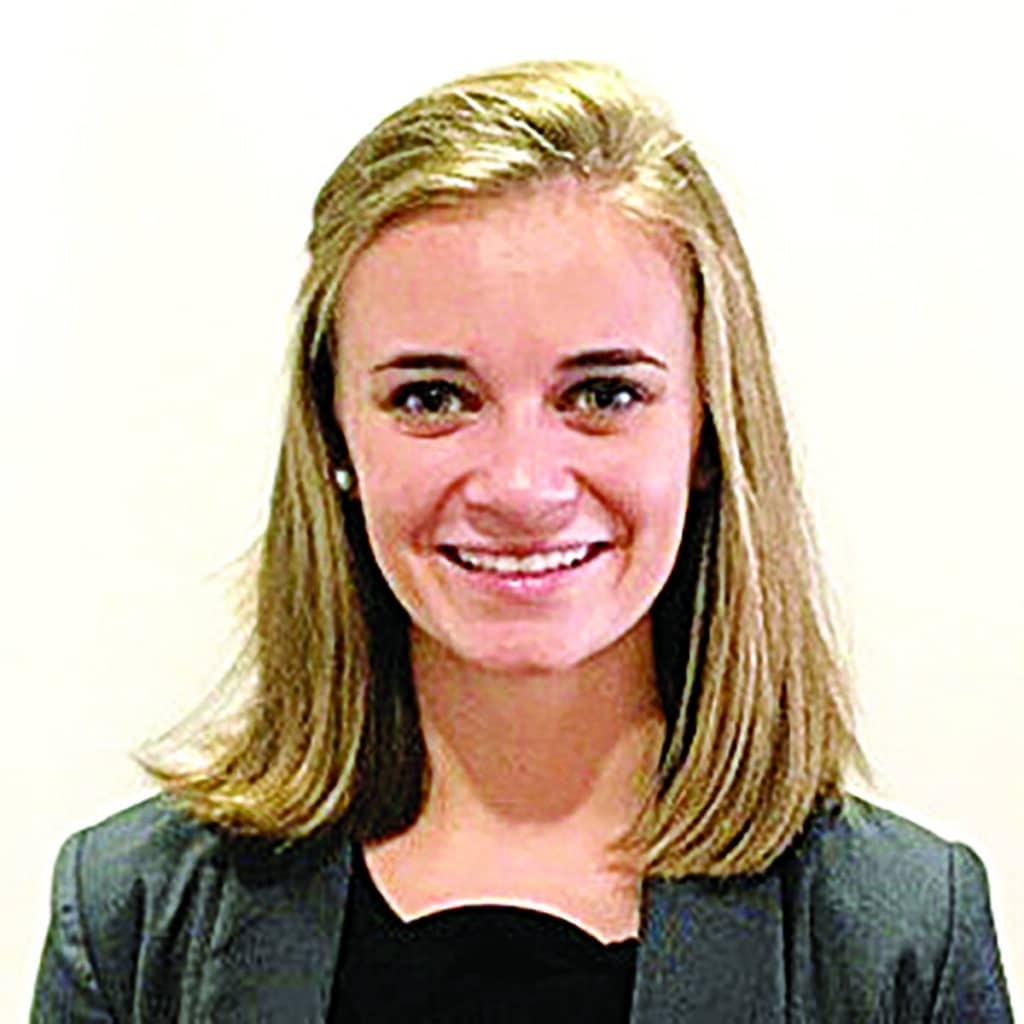
Elizabeth Waid graduated in the Norcross High School Class of 2015 with the International Baccalaureate program. In addition to the PCBA scholarship, she was the recipient of the Fulbright Scholarship, Richter Scholarship and Sanders Scholarship.
She attended Wake Forest University in Winston-Salem, N.C. and graduated with a BA in Economics and German with a minor in global Trade and Commerce studies.
Elizabeth had the opportunity to work as an English Teaching Assistant for eight months at the Austrian Ministry of Education, Science and Research in Imst, Austria. Upon completion of her work in Austria, Elizabeth joined EY as a Business Consultant.
Elizabeth now lives in Charlotte, N.C. and is a Theology Teacher at Charlotte Catholic High School.
Eliza Antonowich
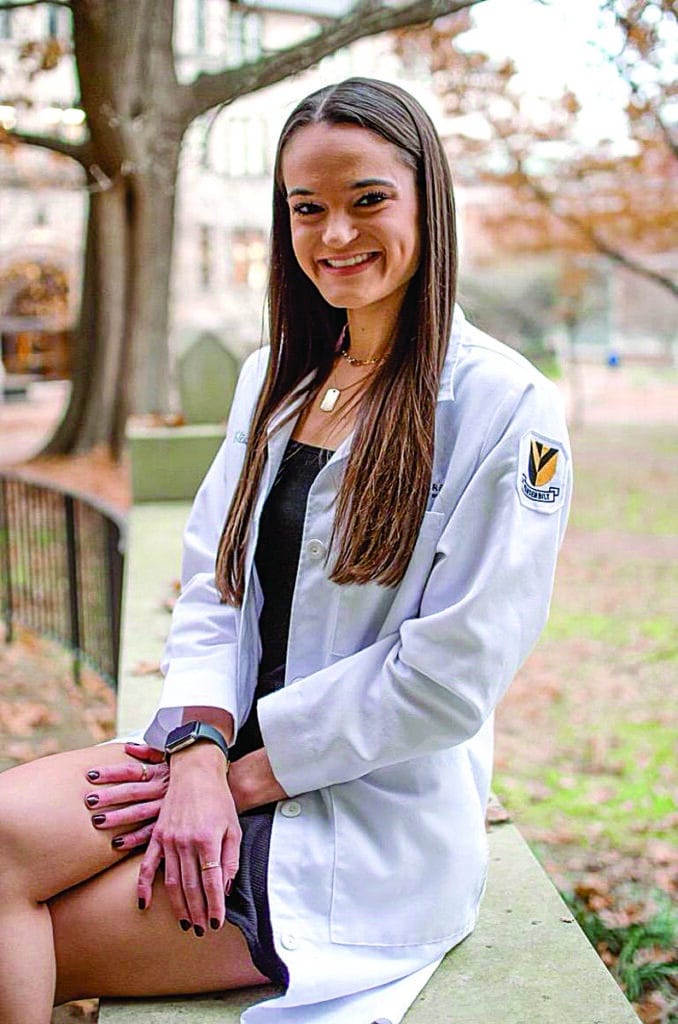
Eliza Antonowich graduated in the Class of 2016 with the International Baccalaureate program from Norcross High School. She graduated from Washington University in St. Louis, Mo. in 2020, majoring in Global Health and Environment.
She also studied International Global Studies and a program in Swahili, Public Health and Environment. In addition to English, Eliza has a professional working knowledge of Spanish and Swahili.
Eliza is a U.S. Army Cadet since 2013 and is an active Army Officer Candidate with the St. Louis Gateway Battalion. Eliza is currently a Research Assistant in the Pre-Exposure Prophylaxis for HIV (PrEP) Program with the Washington University School of Medicine in St. Louis.
Morgan Keller
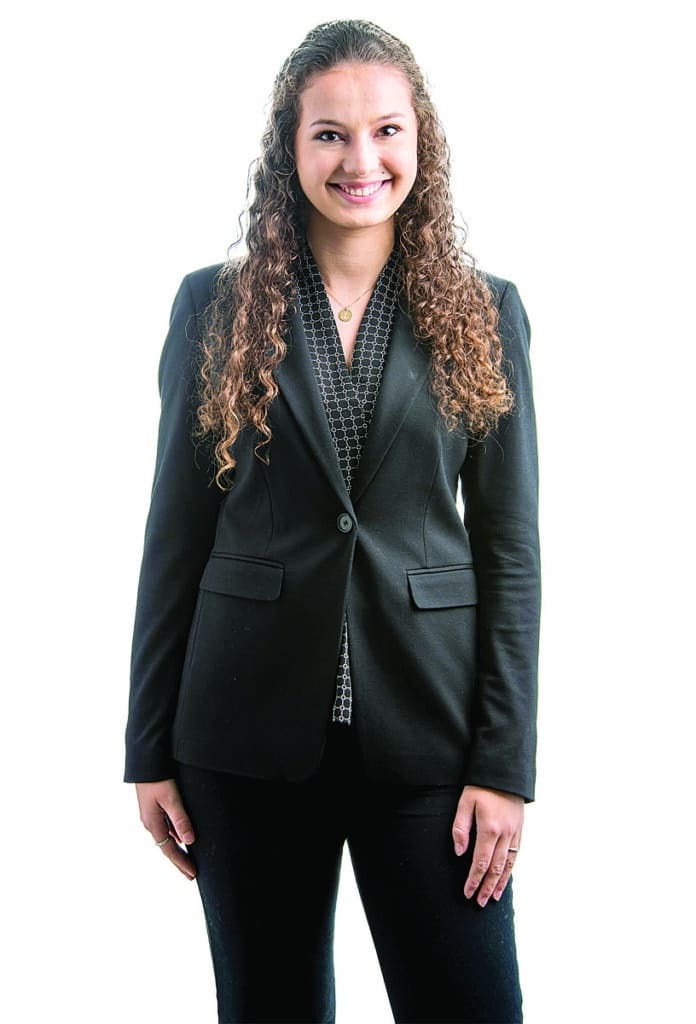
Morgan Keller graduated from Wesleyan High School with the Class of 2017. Morgan used her scholarship dollars to graduate from Georgia Institute of Technology with a BS in Materials Science and Engineering in May 2022.
Morgan is currently working for Corning Optical Communications in the BRiTE commercial Rotational Program where she is rotating through functions of engineering, market development, product line management and sales.
Morgan is looking forward to continuing to incorporate engineering principles within business strategies and developing her professional skill set in whatever direction her career takes her. She has learned the value of nurturing relationships and pouring back into her hometown of Peachtree Corners, even as her career leads her to new opportunities and new communities.
Sarah Lashley (Gries)
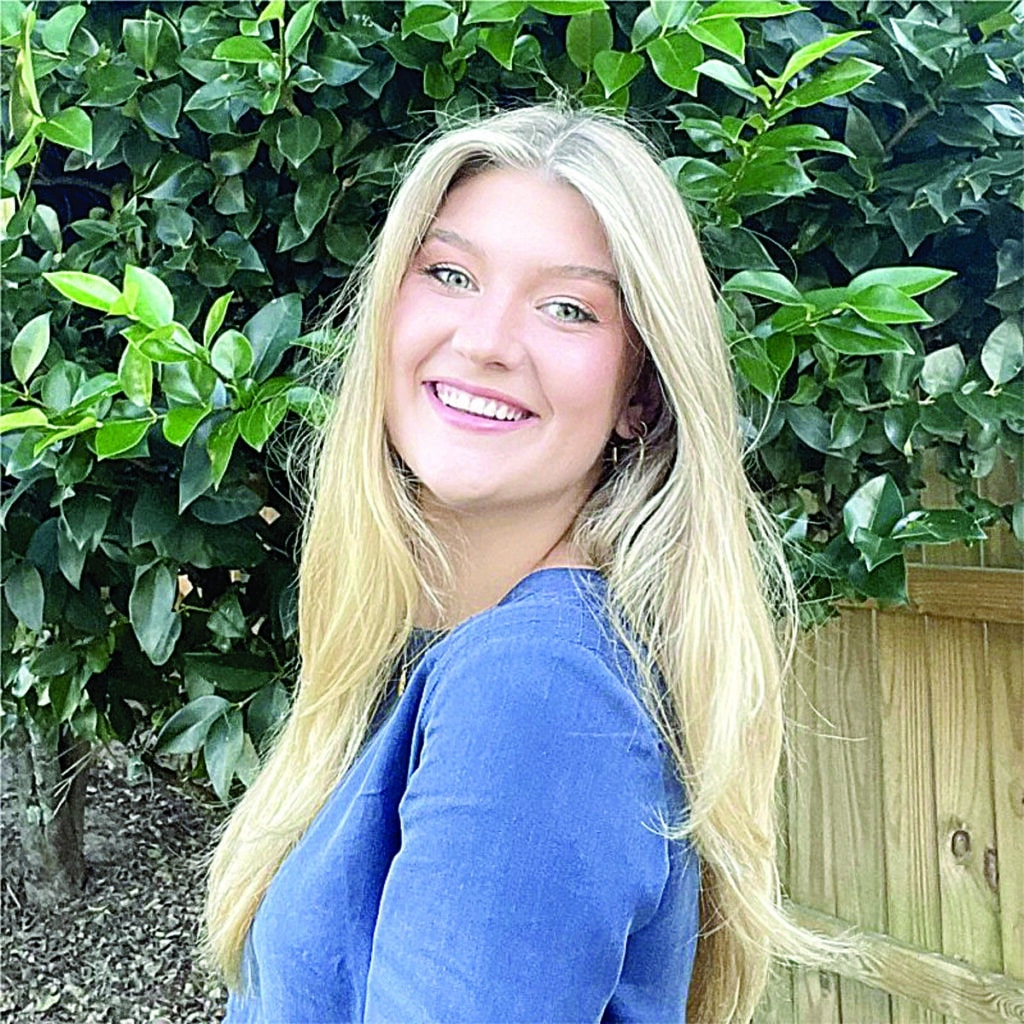
Sarah Lashley graduated from Norcross High School in 2017. She attended the University of Georgia and graduated in 2021 with a degree in Elementary Education. Sarah is currently working as the Marketing Manager at 3DE by Junior Achievement.
Sarah is excited about this role as it allows her the opportunity to pair her background in education with her passion for non-profit marketing. 3DE by Junior Achievement re-engineers high school education to be more relevant, experiential and authentically connected to the complexities of the real world through joint ventures between public school systems and the business community.
Sarah recently moved back to Peachtree Corners with her husband. She is looking forward to becoming well versed in non-profit marketing, knowledgeable in content design and involved in the local Peachtree Corners community while building her family.
Abigail (Abbie) Alf

Abbie Alf graduated from Norcross High School in 2018. She attended the University of Georgia and graduated in May of this year with a BFA in Interior Design and a certificate in Entrepreneurship. Abbie was able to use her scholarship towards purchasing her books and have a greater college experience.
Abbie is currently pursuing her dreams of running her own baking business, Abbie Bakes. She is focusing on growing in the Atlanta area and across the United States. In the next three to five years, Abbie sees establishing a storefront in the Atlanta area and having a stronger presence across the country.
She is excited to see what is to come and appreciates the ability to grow during her years at UGA.
Ian Paul Huelsbeck
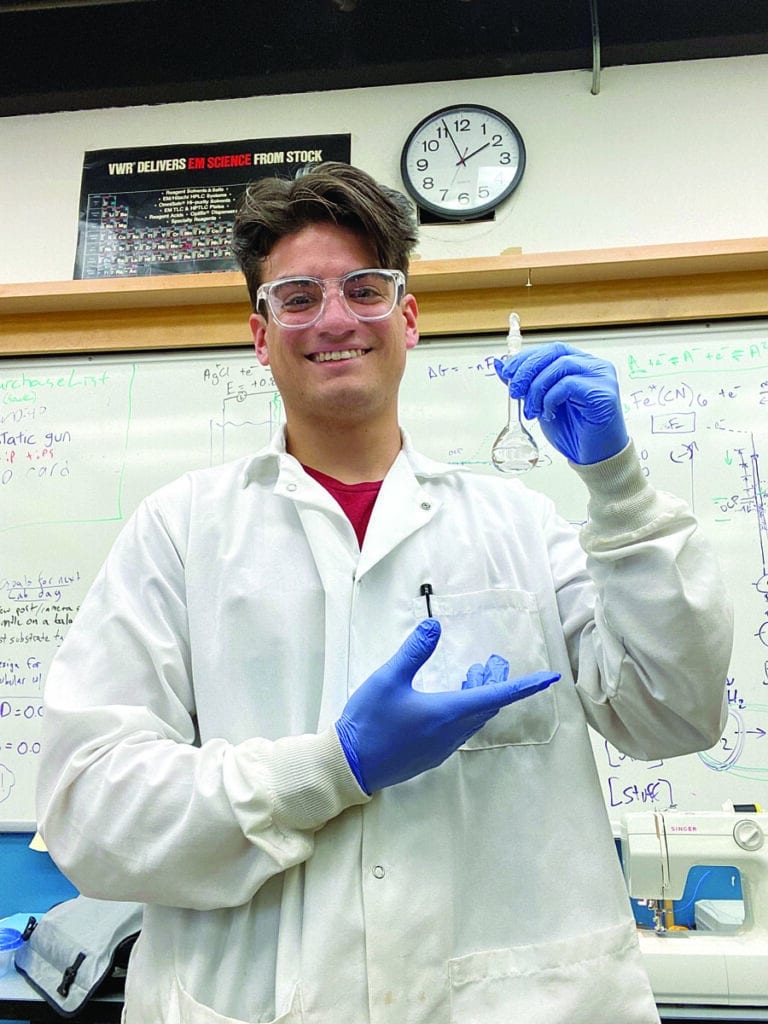
Ian Huelsbeck graduated from Norcross High School in the Class of 2018. He currently attends Colorado College and plans to graduate in May 2023. He is planning to pursue a PhD in Chemistry or attend medical school.
Ian is a research assistant in the Fahrenkrug Lab working on low cost, accessible and open-source sensors to detect PFAS chemicals in drinking water. PFAS chemicals are toxic at one part per trillion and are currently extremely costly to detect. This process would enable at-site detection of specific PFAS compounds at appropriate ranges by untrained users.
Over the next three to five years, Ian sees himself in graduate school or doing work in environmental chemistry. He has learned that he absolutely loves chemistry and wants to do something with it in the future.
Vishva Natarajan
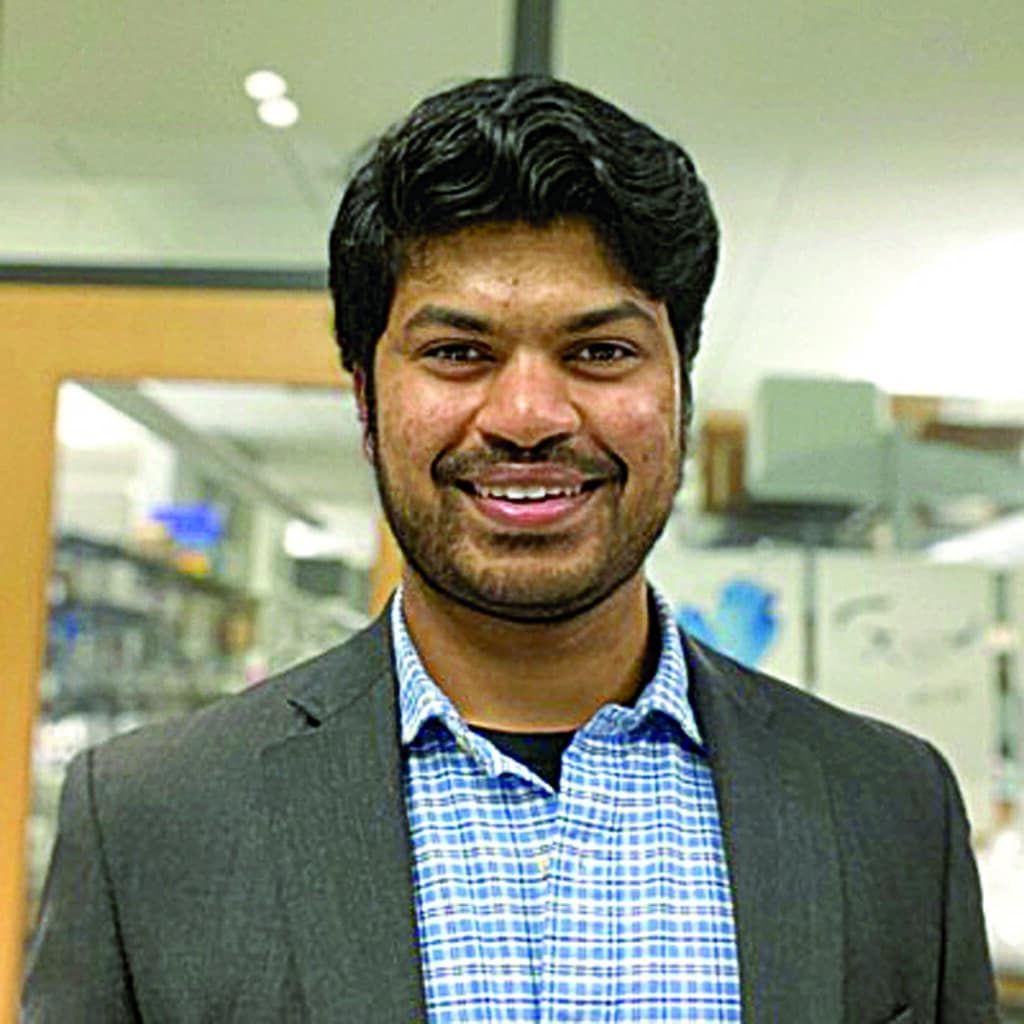
Vishva Natarajan graduated in the Class of 2019 and is currently attending Georgia Institute of Technology for a BS in Biology/Biological Sciences. He is expected to graduate in 2023.
In addition to receiving faculty honors and being on the Dean’s List, Vishva has also received the President’s Undergraduate Research Award (PURA) and the John H. Ridley Award. He is bilingual, speaking both English and Spanish
Vishva has participated in several internships and programs including Georgia Tech Bioinformatics Research Assistance and Pfizer NGS Bioinformatics Internship. He is currently a Research Assistant at Georgia Tech studying computational proteomics.
Through his passion for analyzing high-throughput biological data, Vishva is leveraging the latest tools and technologies to do so.
Connor Creedon
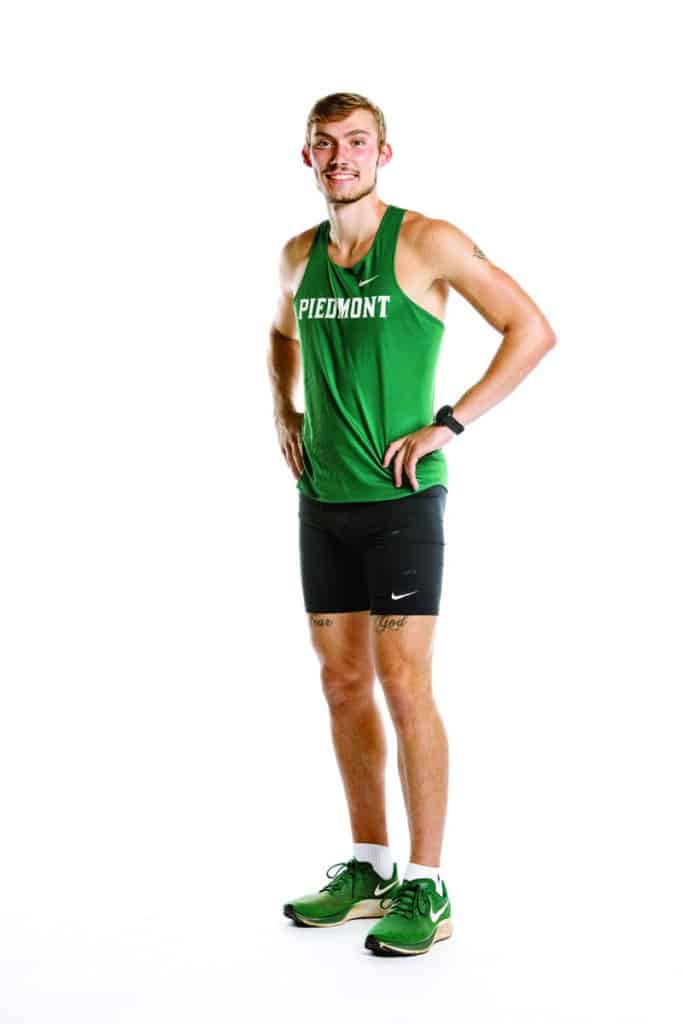
Connor Creedon graduated from Duluth High School in 2019. He is currently using his scholarship to attend Piedmont University, double majoring in Sports Communications and Mass Communications, with a minor in General Business. Connor is set to graduate in Spring 2023.
In the next three to five years, Connor sees himself working in the media in one form or another, most likely in sports. He hopes to cover collegiate and professional sports in journalism, video production, radio production, etc.
From his experience in college, Connor has learned that hard work is required to get anywhere in life, especially academically. Pushing himself to get better in areas where he may not be as strong has helped him get to where he is today, and he is proud of his hard work.
Feben Simeneh
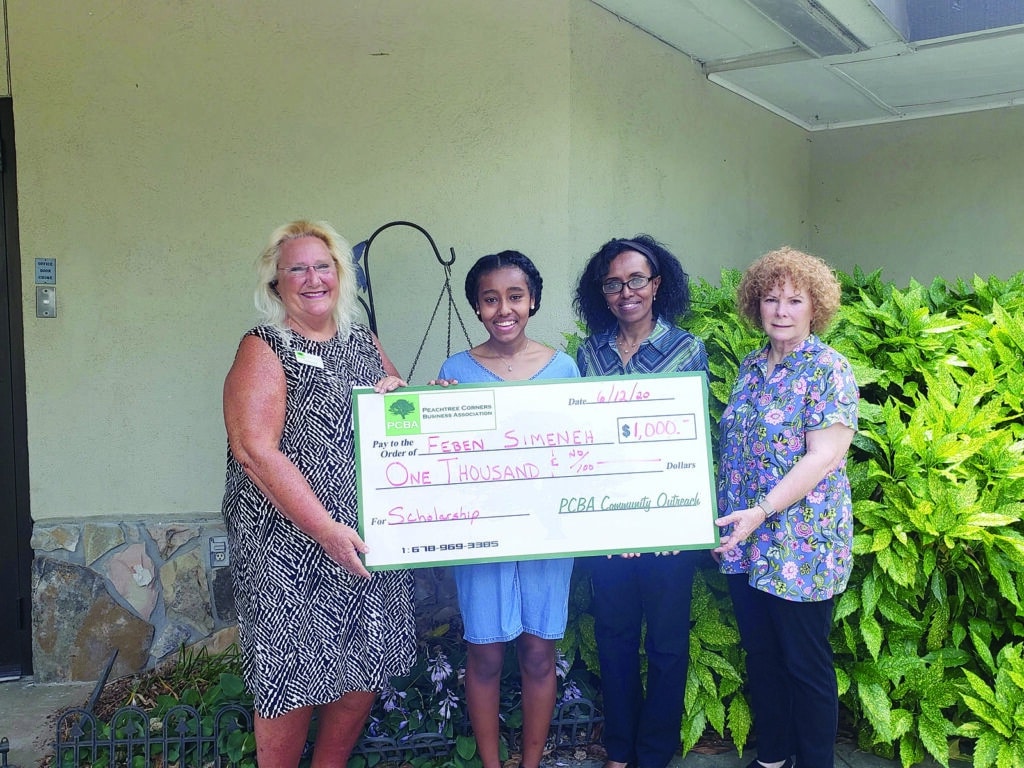
Feben Simeneh is a graduate of the Norcross High School Class of 2020. As Feben pursues her current college studies, she is able to enhance her passion for seeing lives change. She is committed to programs that would further develop her view of the world.
Feben is currently studying International Relations and Biomedical engineering. Her goal is to become a UN peacekeeper and help resolve disputes between countries and create leadership environments through public servitude.
She also would like to help the healthcare industry increase the quality and volume of medical services throughout hospitals in both rural and urban districts.
Maria Cook
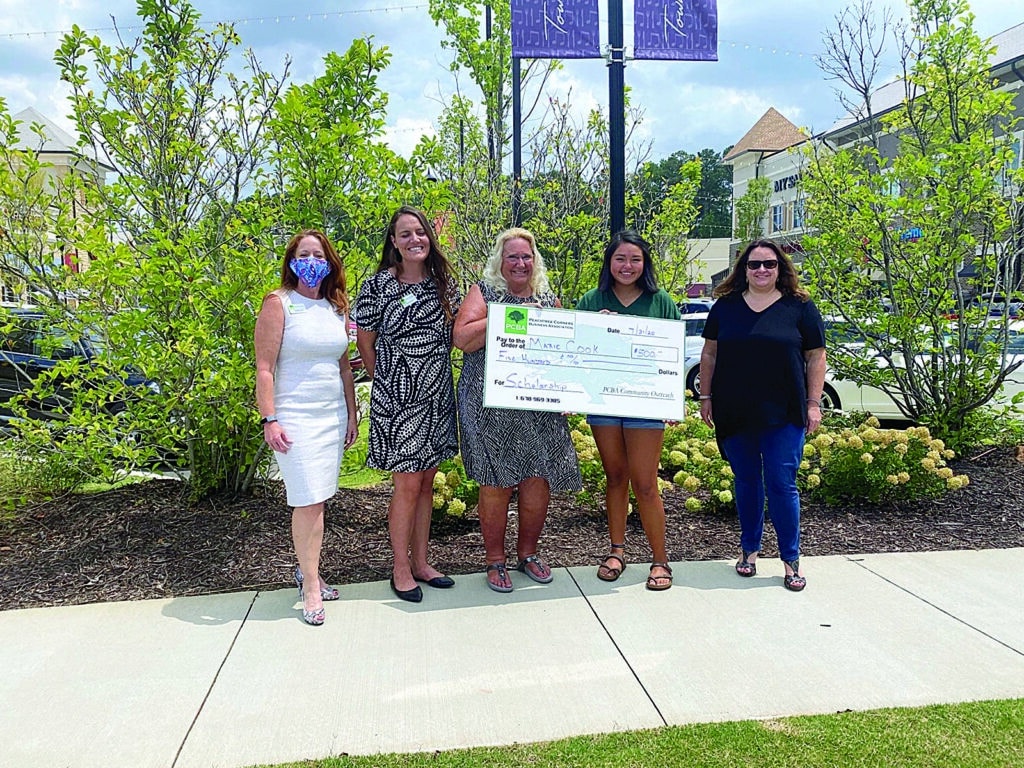
Maria Cook is a graduate of Wesleyan High School with the Class of 2020. She is only the second person in her biological family to ever go to college.
She felt her most impactful service at Wesleyan was when she was able to join the Omicron Service Society. She has volunteered at La Amistad, Corners Outreach and Next Generation.
Maria aspires to be a social worker and to continue to help children in need upon the completion of her college studies.
Katheryn Antonowich
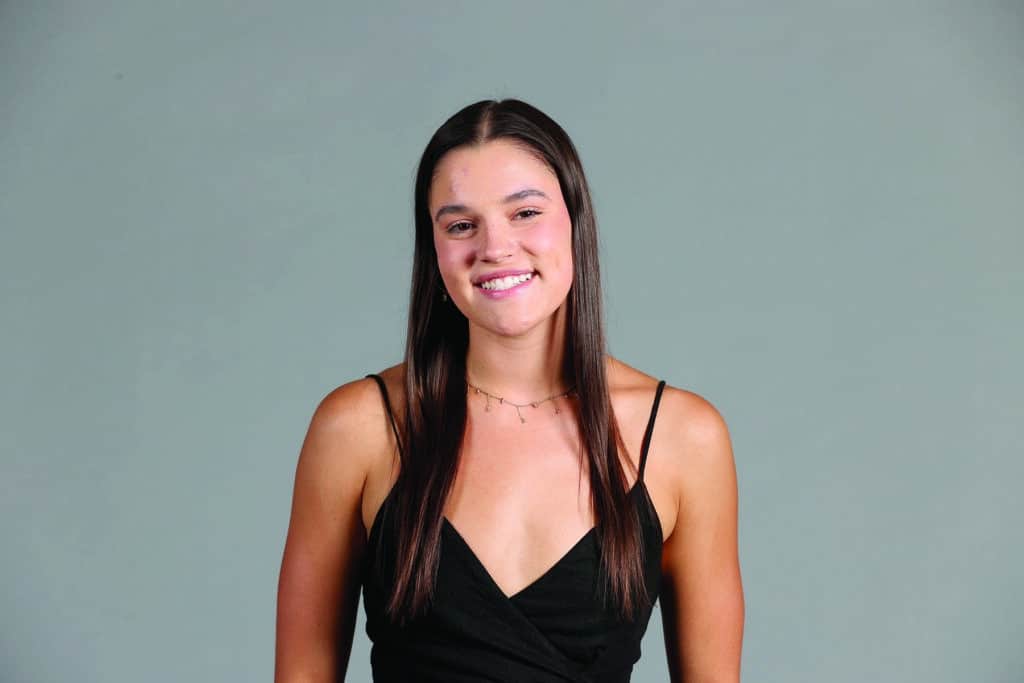
Katheryn Antonowich graduated from Paul Duke STEM High School in 2021 and began college at Miami University in Oxford, Ohio. that fall. She is currently a sophomore in college with a major in Geography and Sustainable Development, a co-major in Sustainability and a minor in History.
As a member of the varsity swim and dive team at Miami, Katheryn practices for 20 hours a week and often travels for competitions. She plans to graduate from Miami University in 2025, by which time she will have completed her bachelor’s degree as well as her master’s degree in Environmental Science.
This summer, Katheryn hopes to study abroad in Luxembourg to explore more paths for her major and learn how to make a difference within her field. Following college, she hopes to work for an international organization or non-profit that combats climate issues and the negative impacts that humans have had on the Earth.
She feels that receiving the PCBA scholarship has allowed her to make the most out of her future, pursue her passions at college and expand her academic experience.
Katherine Graddy
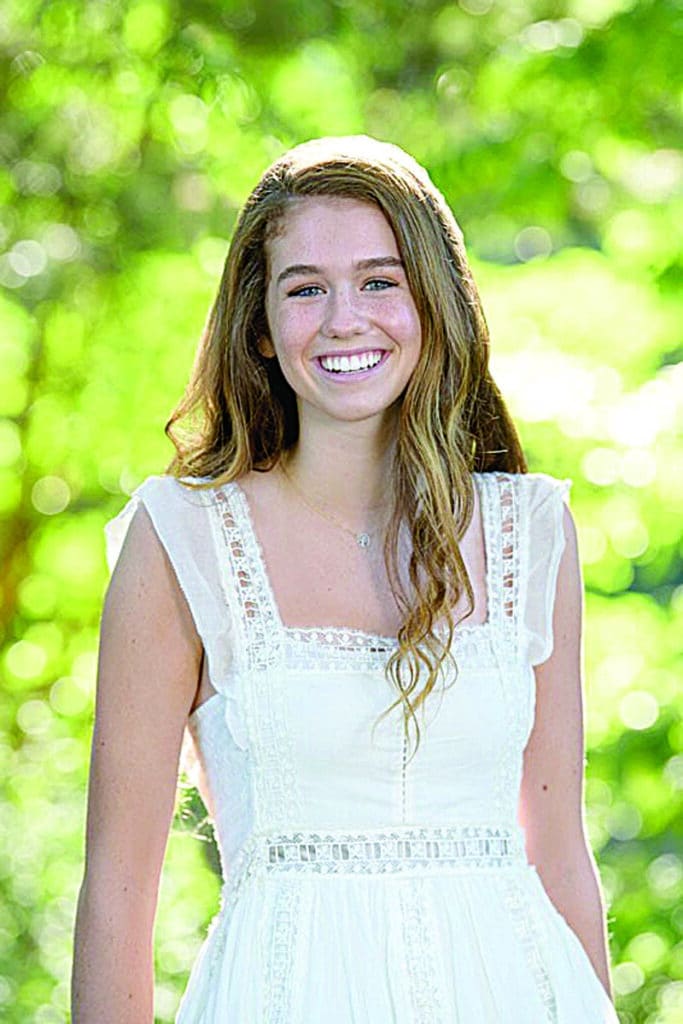
Katherine Graddy graduated from Wesleyan High School in 2021. Currently, she is pursuing her college studies. One of the key takeaways from Katherine’s scholarship essay was the importance of leaving roots in a world where she can travel and connect with more people than ever before.
Katherine wants to look back on life beyond the pandemic and know the faces and names of people in her community. She wants to take moments with lasting impact where her life becomes woven into the stories of the places she goes and the people she meets.
Rachel Lee

Rachel Lee, a recent graduate from the Class of 2022 at Norcross High School, is attending Emory University. Rachel is majoring in Human Health and Economics and minoring in Nutrition. In the next few years, she sees herself pursuing a Public Health degree with a concentration in Nutrition and possibly researching with an Emory professor.
Her time at Emory has only covered three months, but she has learned the importance of continuing to connect with friends from her past. Being at a place where people all over the world come to study, she finds it fascinating how people’s different upbringings shape their knowledge.
Rachel has had the opportunity to attend college while continuing her volunteer work in Peachtree Corners. She has learned three powerful lessons: “lead by example, serve your community and cultivate inclusivity.” With Peachtree Corner roots at the core, she hopes to demonstrate each of these core lessons.
Sarah Lim

Sarah Lim is a recent graduate of the Wesleyan High School Class of 2022. She is currently attending Emory University and has used her scholarship to flourish during her first year of college.
She plans to graduate Emory in 2026 and is studying Pre-Law. Sarah is involved in an all-girls+ a cappella group called “the Gathering” at Emory and a conversation club on campus, Table Talk. She is the community service chair of her residence hall and has found a wonderful community with Bread Coffeehouse Ministry.
Sarah sees herself discovering her passions and exploring various interests during college. She hopes to study abroad and gain practical experience with advocacy, service and education work. She has learned that her supportive community and network of valuable mentors and friends are a main reason she has found success and joy during this chapter of her life.
The PCBA will award two $1,000 scholarships April through May 2023. The 2022-2023 application will be available for completion January 1, 2023. The full application, essay and transcripts must be received no later than March 8, 2023. Questions regarding the scholarship program may be directed to scholarship@peachtreecornersba.com.
Related
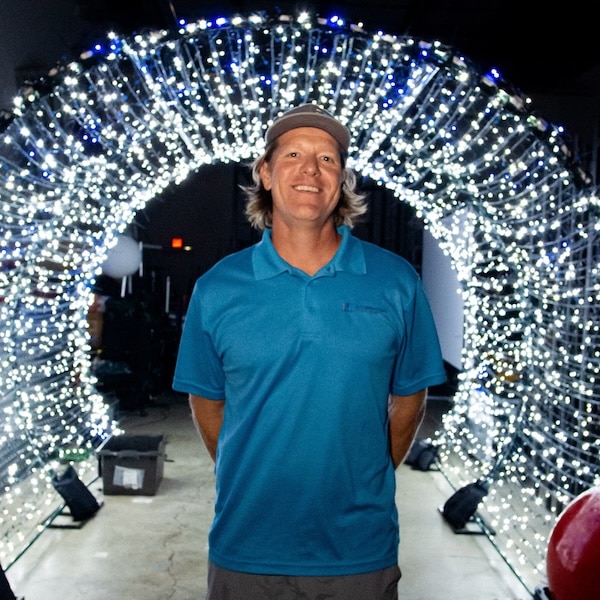
Peachtree Corners resident, Bill Frey, founder of Illuminating Design Inc., has stepped into the limelight on the acclaimed reality series The Blox to vie for the coveted title of the greatest start-up company in the nation.
The program follows Frey and his fellow contestants as they tackle a series of high-stakes business challenges, offering viewers an unprecedented look at the trials, triumphs and transformation of an emerging entrepreneur.
Now in its sixteenth season, The Blox bills itself as “the largest live-in entrepreneurship competition in the galaxy.” Over the years, it has evolved into a trending docuseries, available for viewing on multiple platforms — the free mobile app (for Android and iOS), on Prime Video, at betablox.com or on Facebook at BetaBlox.
Joining The Blox
Twenty years ago, Frey saw an opportunity to bring exceptional service, quality design and accountability to a rising lighting industry. Guided by his entrepreneurial spirit, he has sought opportunities to take his business to new heights and found just that in The Blox.
Unlike conventional entrepreneurial competitions, The Blox, a brainchild of MTV reality star and entrepreneur Weston “Wes” Bergmann — best known for his appearances on shows like The Real World and The Challenge — offers a new, groundbreaking format. Participants are immersed in a unique environment, living together and confronting a series of challenges that test their entrepreneurial acumen.
Frey’s talent and vision propelled him to be among the fortunate few selected to compete on show out of an impressive pool of 50,000 applicants.
“I am humbled and honored to be a part of The Blox, a game-changing platform that has given me the opportunity to evolve both personally and professionally,” he shared. “The show has been an incredible learning experience, and I am grateful for the chance to showcase my business and its potential on such a remarkable stage.”
You can follow Frey as he is featured competing in different entrepreneurial challenges throughout the series, which is divided into an eight-episode arc that premiered on March 23. New episodes are released weekly.
For more information about Bill Frey and Illuminating Design, visit illuminating-design.com.
Related
Business
Expanding Horizons: How KGM Technologies Balances Defense, Medical, and Precision Manufacturing
Published
1 week agoon
March 27, 2025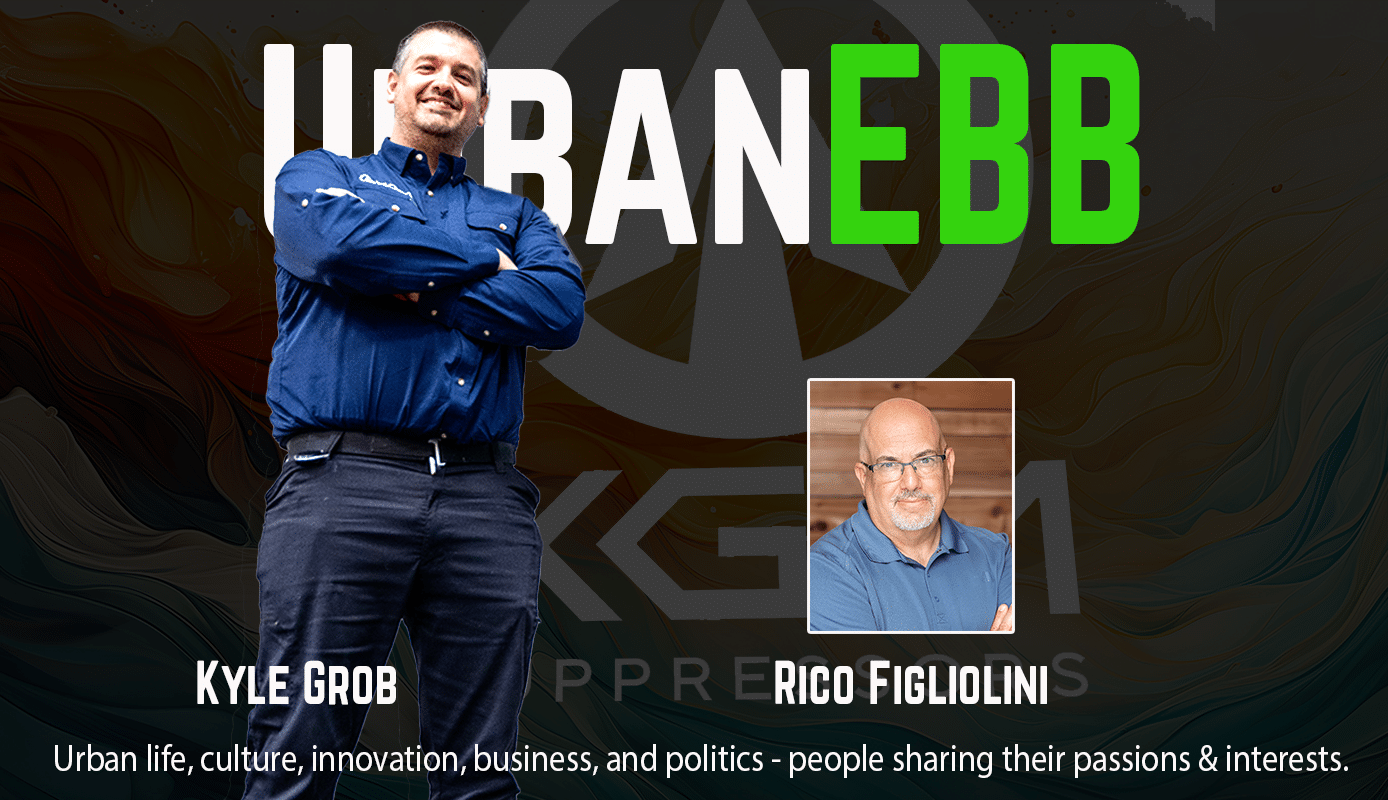
Kyle Grob on innovation, diversification, and the future of skilled trades
In this episode of UrbanEBB, host Rico Figliolini speaks with Kyle Grob, CEO and founder of Peachtree Corners-based KGM Technologies, a precision manufacturing company specializing in firearm suppressors and expanding into medical device production. Kyle shares insights on growing a business during COVID-19, navigating ATF regulations, and how Georgia fosters innovation in manufacturing.
The conversation also explores the future of skilled trades, the challenges of hiring motivated workers, and KGM’s commitment to workforce development through partnerships with vocational schools. Whether you’re interested in business growth, advanced manufacturing, or the evolving job market, this episode is packed with valuable insights.
Key Takeaways & Highlights:
- Adapting to Change – How KGM transitioned from automotive and defense contracts to firearm suppressor manufacturing and medical devices.
- The Impact of ATF Regulations – Digital processing has drastically reduced wait times for suppressor purchases.
- Workforce Challenges – The decline of skilled trades and the difficulty of hiring motivated employees in manufacturing.
- Medical Technology Expansion – KGM’s role in producing stroke rehabilitation devices and scaling medical manufacturing.
- Networking & Diversification – The importance of industry connections in finding new opportunities.
- The Value of Trade Schools – How partnerships with Maxwell High School and other vocational programs are shaping the next generation of skilled workers.
- Patents & Innovation – KGM’s goal of filing at least one new patent every year.
- The Role of Suppressors – Their use in law enforcement, hunting, and protecting hearing health.
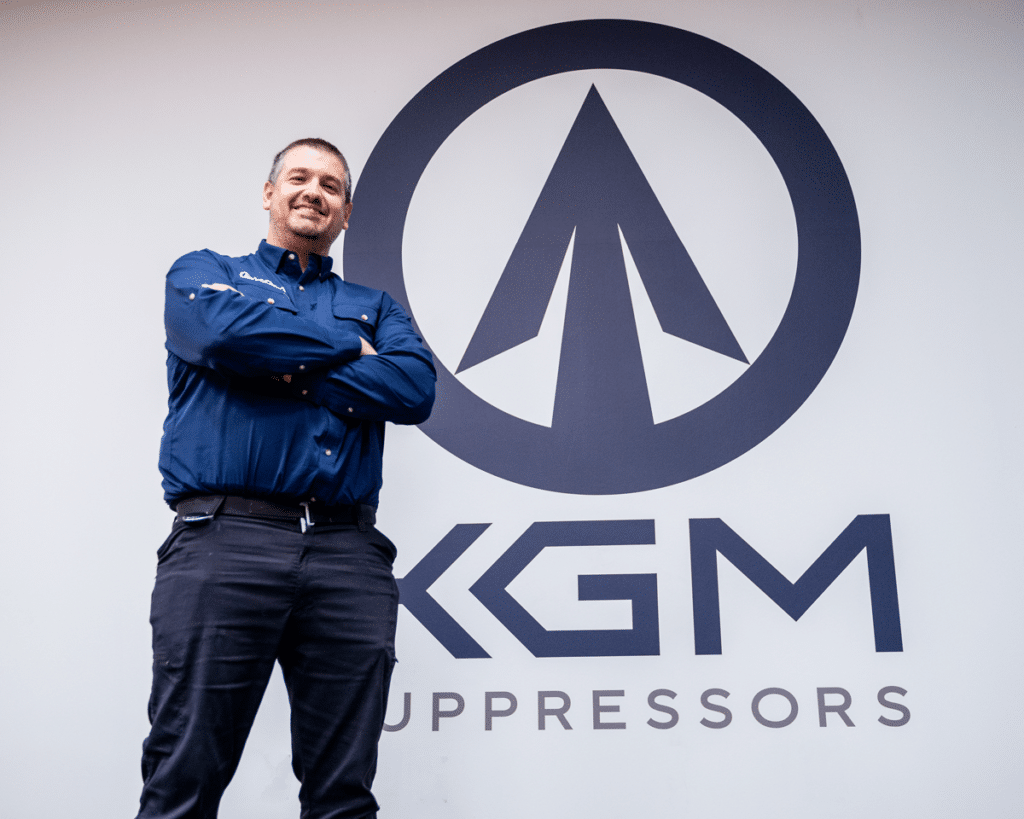
Transcript:
00:00:01 – Rico Figliolini
Hi, everyone. This is Rico Figliolini, host of Urban Ebb here in the city of Peachtree Corners, just north of Atlanta. I appreciate you joining us. We have a great guest today, a Peachtree Corners-based business, very different and unique industry, Kyle Grob. Appreciate you being with me, Kyle.
00:00:18 – Kyle Grob
Oh, thank you for having me. Glad to be here.
00:00:19 – Rico Figliolini
It’s going to be a good discussion on a bit of company, a bit of work, and manpower, the lack of. But before we get into that, I just want to say thank you to two of our sponsors, EV Remodeling, Inc., and the owner, Eli, who lives here in Peachtree Corners also. His family does. And he does great work from design to build. Whole house renovation, or if you need an extension on the house, he’s the guy to look for. They’ve done over 260 such renovation work. So check them out, evremodelinginc.com. And then also Vox Pop Uli also family owned, also in Peachtree Corners. And they’re a company that if you have a brand and if you’re a business and you need to bring that brand to life, pretty much you can do it. 1,600 vehicle wraps I think this past year anything you can want, imprinted, embroidered, silk screen, whatever it is. If you have a logo and you want it on an object of any sort, challenge them. I can’t tell you how many different things they’ve put logos on. So all great stuff. Check them out, voxpopuli.com, where you can find them. So, now that I’ve taken care of the sponsors who support us for our journalism and podcasts. Kyle is the founder and currently CEO of KGM Technology. Yeah. So, based in Peachtree Corners, tell us just quickly a little bit about what the company is.
00:01:42 – Kyle Grob
So, the company started in 2012 as a kind of a fabrication, job shop, machining fabrication. And we kind of evolved out of the automotive space and got into the defense world and slowly grew over years. And then we moved into this building in 2019 and have been growing ever since.
00:02:03 – Rico Figliolini
2019, COVID.
00:02:05 – Kyle Grob
Yeah, so COVID was actually very good for us. It was wide open, running multiple shifts. While many businesses were shut down, we couldn’t hire enough people, we couldn’t build enough products.
00:02:17 – Rico Figliolini
We’ll get into that because it may be a bit of what you’re going on now. So your business is military suppressors, which is the biggest part. You told me once at one point when I took a tour earlier, a week ago, you said we’re precision manufacturers.
00:02:34 – Kyle Grob
Yeah, so the back end, the wholeness of the company is precision manufacturing. Our forward-facing product is suppressors. That’s mainly what we sell to commercial, law enforcement, military, overseas, all kinds of stuff like that. But we’re in all kinds of stuff. Contract manufacturing, medical device manufacturing and supply, all the way down to machining and research and development. And it’s just a little bit of everything. But again, forward facing is the product line, yes.
00:03:02 – Rico Figliolini
Sure. And you’ve done this since 2019, right? Actually before that.
00:03:07 – Kyle Grob
Well, no, no. Yeah. So we started suppressors in 2015, 2016. And then, but it was kind of a side product to what we were doing. Really grew in 2019. And then really kind of just kept growing through COVID. And this is kind of where we are now.
00:03:22 – Rico Figliolini
Interesting. So your family is steeped in military? In all branches, I guess?
00:03:25 – Kyle Grob
Yeah. Army and Navy.
00:03:27 – Rico Figliolini
Army and Navy. And you hire veterans?
00:03:29 – Kyle Grob
We hire a lot of veterans. We have a lot of veterans that work for us. I try to hire as many as we can. They make very good employees. But, you know, it could probably be a whole nother podcast in itself, what happens to veterans when they come back from service. And so we try to search them out and give people a chance.
00:03:34 – Rico Figliolini
Getting involved in this type of market since, you know, you started, has it changed in the way you do business?
00:04:03 – Kyle Grob
Yeah, because we are so highly regulated from, you know, the ATF regulates us pretty heavily. The ability for consumers to essentially purchase the product and all the paperwork and background check that goes in it has evolved since we started. It used to be nine months, 12, 15 months to get a product. So you buy it, wait for your paperwork for a year or more. You’d almost forget about the product. And then all of a sudden it’d pop up one day. Well, last year, everything went digital. And so now everything’s digital. You go from months or years wait time to days, hours, weeks.
00:04:38 – Rico Figliolini
So you can order this stuff online and get it shipped to you?
00:04:41 – Kyle Grob
No, so you can’t really ship it to your house. So you still have to go to a dealer or go like that. You’re still submitting fingerprints. You’re still submitting your photos. But the process is now all digitized. There’s no manual entry on the ATF side. Everything goes through much faster. And again, we’ve seen, you know, three hour wait times. Where you fill out your paperwork, go to a long lunch and all of a sudden your suppressor is approved.
00:05:04 – Rico Figliolini
So if you have a gun permit or a carry permit, does that make it easy?
00:05:08 – Kyle Grob
It doesn’t really because it’s a completely separate background check. So this, every suppressor you purchase is its own background check. So you treat it like a firearm purchase every single time, except it goes through a kind of a different, it goes through the FBI on the NIC side, which is their background check service. But it goes through separate checking on the ATF side as well. So it is a little bit more involved process than buying a handgun or a rifle or something like that. But similar agencies touch it, I guess.
00:05:38 – Rico Figliolini
Okay. This being the state of Georgia, other states have different ways of doing things. You’ve been to trade shows. You’re involved in the industry a bit. Do you see Georgia being a good place to do business here in this market?
00:05:52 – Kyle Grob
Georgia is a very friendly state. And even just manufacturing in general, you’ve seen all the companies that have moved here. You have, you know, most major automotive companies are either building or about to build here. You got SK batteries. You have some big companies that are moving to Georgia. And then film. I mean, film is massive here now with all the tax breaks. And so you see a lot of stuff coming to Georgia from an industry standpoint, but it’s also very firearms friendly. There’s a lot of big companies here in Georgia. You have Glock here in Georgia. You have Daniel Defense. You have a lot of really big companies. I think Remington’s got a place here. So it is very, you know, Georgia, Alabama, Tennessee, South Carolina. There’s a lot of very friendly states when it comes to manufacturing and firearms.
00:06:35 – Rico Figliolini
So how do you go about selling your product then? I mean, if you go to trade shows, RFPs?
00:06:40 – Kyle Grob
So on the military side, it’s more RFPs, it’s more contract basis. We partner with a lot of firearms companies because a lot of submissions for weapons systems require, you know, we’re viewed as kind of an add-on to a weapon system. Yeah, it’s an accessory. And then on the law enforcement side, we go demos, we have dealers. And then on the commercial side, we have distributors that distribute to dealers. And then we have dealers that essentially are walk-in brick and mortar stores. And we sell directly to them as well.
00:07:07 – Rico Figliolini
So for most people that may not know, why would someone want a suppressor on the gun? Why would a police officer, let’s say a SWAT team, want to suppress it? What makes it?
00:07:17 – Kyle Grob
Really the biggest one is health and safety. It’s the biggest one. So from an officer-involved shooting, or say if he shoots without ear protection, every shot is permanent hearing damage. So if he shoots one in his entire career, he’s permanent hearing damage, he’s on disability from an auditory standpoint. You look at, you know, what you could do, and then you look at, you know, God forbid all the school shootings we’ve had and school resource. When you shoot inside of a building, it’s even magnified. So it’s very, very loud in general, and then you put it inside of a building and it gets worse. So there’s been cases where you’ve seen lawsuits where, you know, a SWAT team or someone’s gone into a house or a building and essentially, you know, saved someone, but they discharged their short barrel rifle inside the house. And then everyone that’s not wearing ear protection, i.e. the family, they’re all deaf or hearing damage, and they end up suing the city. And we see it a lot. And so from a health and safety standpoint, there’s that. You could look at accuracy. And then you look at, on the hunting side of being more courteous to neighbors. It allows you to hunt closer to, you know, other people and stuff like that. Yeah, so there’s so many things that add to it. And then you add, you know, on the military side, it helps with being able to, you know, hide your location and just be more effective. Suppress flash and stuff like that. So a myriad of uses, but really the bigger one is the health and safety side of things.
00:08:40 – Rico Figliolini
I was speaking to a person today that on his old farm he used to shoot his rifle and stuff. And he told me he said, this ear? Pretty much gone. He says now hearing aid. Because he didn’t think that he needed a, you know plugs or anything. A suppressor probably would have helped him. Well at least the plugs might have helped a little bit. But no one thinks about that.
00:08:59 – Kyle Grob
You don’t, you don’t. And you look at the law enforcement side and kind of the heat of moment, you don’t think about it. It’s not something, you’re either fighting for your life or, you know, your split moment decision. Like you don’t think about putting your plug on or throwing a plug in or something like that. It’s a split second decision. So with suppressors, you can really mitigate a lot of that risk. Now, does it make it the Hollywood movie side? No. The only thing that gets even close to that is 22. And it’s because the subsonic is very quiet like that. Any centerfire rifle cartridge you’re never going to get away from supersonic crack. It’s only so quiet you can get it. It is a suppressor, not a silencer. And that’s a probably a very heated topic. It’s a movie thing, yes. But in practical application they do a lot of work for the size of the product and what you use it for.
00:09:50 – Rico Figliolini
So now going from suppressors to the medical industry. You know when you showed me around and you talked to me about mechanical therapeutic systems for a company you’re doing work for inside the perimeter. That you almost had to double the size of your floor space, essentially.
00:10:07 – Kyle Grob
Yeah, so it’s kind of an interesting story. We go back to, we’re a precision manufacturing company. We make contract stuff. We do defense. We do a little bit of everything. And it was kind of a friend of a friend. Their business was scaling and really needed help scaling the manufacturing side of their product. And it was really a right place, right time. It kind of fit in our warehouse. While it’s not exactly what we make, precision assembly, scaling, manufacturing, supply chain, logistics, all that stuff. That’s what we do every day. So I’m just building something a little different versus what I have been building. So it was a great opportunity. Again, the right side of the perimeter is Atlanta company. And it was just a really good right place, right time. Good fit for what they were looking for. Good fit for us on the diversification side. So it’s just it really worked and we’re growing weekly. Yeah, we’re blowing walls down and yeah we’ve tripled the space twice now since we yarded in like October of last year. So it’s very very quick.
00:11:07 – Rico Figliolini
When I walked through and you gave me the tour, I mean there were quite a few people just in that place doing the assemblage. I think you even told me, you said well, how far down can you? Millionth of an inch? Precision?
00:11:21 – Kyle Grob
Yeah, so it’s like our EDMs and some of our stuff, we calculate microns, millionth of an inch.
00:11:27 – Rico Figliolini
So that’s an industry, obviously, you want to get more into.
00:11:30 – Kyle Grob
Yeah, it is. It was interesting. I had kind of heard about the medical manufacturing side, and the more we dug into it, the more I realized how many companies like the company we’re helping are out there. And they have a great idea, a great concept, but they’re either doctors or they’re pcs or biomedical. You know they’ve developed great product but they don’t know the manufacturing side or they don’t know how to scale the logistics. Yes, scaling. So it’s, there’s so many good ideas that maybe never ever come to market or never could reach the potential they could because they don’t know the back end. They don’t know the manufacturing, they don’t know how to. Make five of something is very different than making 500, is very different than making 5,000. And it’s just a different skill set. It’s a different knowledge base. And we’re very good at it. And it was a really, really good fit. And it’s something we believe in. We believe in the medical stuff as much as we believe in the defense. Every day we’re building something to help someone else.
00:12:29 – Rico Figliolini
And to get people to understand a little bit, this particular thing was a therapeutic.
00:12:34 – Kyle Grob
Yeah it’s a, without going into too much detail, it’s a stroke therapy device. It’s used for rehab of stroke patients so that they can actually rehab at home versus having to go into a therapy office. And so it’s just grown immensely and that’s, the product’s done well.
00:12:50 – Rico Figliolini
So how do you go after that market? You know, so if another business person, you know, when you, when you diversify, it’s not easy, right? You’re all set in one way. You have 100% of the direction going one way. How do you do that? If another company was listening to this, how would they be able to diversify? So what challenges did you see?
00:13:10 – Kyle Grob
The challenges, like I said, we very much stumbled into this one. Not saying we weren’t looking, and that’s kind of how we did it, but honestly, it was network. And the guy that owns this company, owns another company and he’s an investment group with another other. So a lot of it is networking and being open and willing to take on a challenge that you may not. Be like, oh I have no business in that, well if you’re good at what you do over here and you can see you can cross the lines you can compare, you’d be surprised what you can do. And then you go to the trade shows. Like there are medical device trade shows. Go to those and walk around and say, hey I’m a manufacturer, or I’m this, I’m looking at getting into this market. Do you have a need for X, what I do? Putting yourself out there and going like, look, this is out of my market, but I’m good at this. I would like to try this and just be open and willing to, A, to fail because you’re going to fail more than you succeed, but be willing to try. And that’s the big thing was the leap. Like we took a leap to do this. I had a good feeling that we could do it. But at the end of the day, like you still have to take the leap.
00:14:17 – Rico Figliolini
You’re a CEO now and you were a founder, but you were on the board. You were chairman of the board?
00:14:22 – Kyle Grob
No, no, not chair on the board. I was more on the technical side. So as we were growing the business, I was CTO. And so we were heading kind of down a different path and it was just a the board kind of wanted to see a different change in the way the company was run. And again, my background, why I said, I wasn’t running the day to day, most more on the manufacturing side and technology and patents and stuff like that. And so, board made a shift and I took back over the company. You know, I go from running it many years ago, to running again. Which happens a lot in small companies. And it was a, we wanted to head down the manufacturing path and that’s what I know. So we made a change and I stepped back in last year and been riding the train ever since.
00:15:11 – Rico Figliolini
Good, good. It’s great to have a company expanding and doing well in Peachtree Corners.
00:15:13 – Kyle Grob
Yeah, yeah. Happy to be here.
00:15:17 – Rico Figliolini
Being an employer of veterans, being steeped in family military and stuff, you do outreach, you do community fundraising in that field, in that area.
00:15:29 – Kyle Grob
Yeah, we do, again, more in the defense space, but we do some charity work with several organizations. And again, we donate product. We do stuff for raffles and fundraisers, and we do a lot of stuff like that. Because I really do believe in giving back to the market and giving back to those people. So it’s something we do a decent amount of. I would like to do more this year. That’s kind of what we’re trying to find some other organizations that do stuff with. But we try to do as much as we can. There’s one group, and I’ll be happy to say the name, but Guardian Group. And it’s Guardian Long Range. And they have a precision rifle series. It’s a shooting competition, but it’s for fun. And they have four or five stops all around the U.S. And we outfitted all their rifles that they let people use for trials and stuff like that. We outfitted all the suppressors. So maybe their first competition experience is with a suppressed rifle. So we do stuff with them every year. A guy named Gary is the one that founded that. So great group. But he has a lot of, most of his stuff is for foster kids. He’s a foster kid himself, and he does, every single dime of that goes right into helping foster kids, helping place foster kids, and stuff like that.
00:16:41 – Rico Figliolini
Wow, that is neat. That is cool. I didn’t think about that. So, you know, leadership, company, what comes to mind when you’re, you know, when you’re looking ahead for the next few years?
00:16:55 – Kyle Grob
Really, my biggest push is diversification. Is trying to grow the medical side for sure, grow my contract manufacturing, and really try to build some stable streams around. Everyone knows the firearms industry goes up and down. It’s always cyclical. And so trying to build a larger company where I can have some overlying pathways and diversify and stuff like that so that I can clip the waves and be able to grow the business without relying as much on a very cyclical market. So that’s really the big try. We’re pushing a lot of technology. We’re trying for a patent a year, or a patent every two years. Yeah, we’re four deep already, with two more applied. So we do a lot on the patent side, a lot on the testing and development side. But yeah, growing the medical is really the big one I’m focusing on in the next year or so.
00:17:45 – Rico Figliolini
Yeah, one of the things you have in the house is a firearm range. You told me, and you can put a .50 caliber?
00:17:52 – Kyle Grob
Yeah, so we shoot up to .50 caliber indoors. Yeah, so we have a, it’s a lab as much as it is a range where we can do all of our instrumentation and we develop based on data. So we use it. We shoot it in almost every single day. We’re doing testing and development. We do, you know, demos for customers and stuff like that. But yeah, we’ve, pretty extensive room back there.
00:17:54 – Rico Figliolini
Yes, it’s amazing. Small. Smaller than this conference room.
00:17:58 – Kyle Grob
Yeah, yeah. It’s not, it’s not very big. It’s not a big long range, but it’s heavily instrumented.
00:18:22 – Rico Figliolini
I can’t even imagine shooting a 50 caliber in there, how that would sound.
00:18:25 – Kyle Grob
Oh it, unsuppressed it’ll lift the ceiling tiles. It’ll pressurize the room, yeah so.
00:18:31 – Rico Figliolini
So lots of work yeah expanding you’re looking towards the future and stuff. One of the biggest problems I guess, and we’re going to go right into that is finding employees. Finding skilled employees or motivated employees. Maybe not even skilled, maybe motivated. How does that?
00:18:49 – Kyle Grob
I’ll trade motivation for skill. I’ll trade because what we do is kind of unique. Even on the manufacturing side, we have very nice machines. We do things to a very, very high tolerance. And even with machining background, we’ve found that some people have either preconceived notions or bad habits or stuff like that. We’re getting to the point now where I would rather have someone that has a little bit of mechanical aptitude, some basic knowledge, or someone out of trade school, and I’d rather just teach them. And finding someone that’s willing, even on the medical side, I’d rather have someone come in that wants to just come in and work every single day, take pride in the product they put out. You don’t have to even be that knowledgeable about what we do. I’ll train you and do whatever we need to do, but someone to actually come in and do it is one of the biggest struggles we find. We’ve had you know, multiple staffing agencies and all stuff like that. And we have people, we had some people the other day that came in for four hours, just left during lunch, never came back. And yeah, just it’s, the workforce is, it’s been disappointing, I guess. And seeing, especially on the technical side, I mean, the craves, the trades, the crafts, like a lot of that stuff is dying. Like people are not, you look in the like tool and dye. Oh, that’s enough. That’s no, so most people don’t know how injection mold stuff works and like that. The craftsmen that build those tools, that is a dying art. There’s only one or two schools in the U.S. that do it. I don’t know any of those guys that make less than six figures. None of them. And, you know, you look at plumbers and electricians and welders. I come from a welding background. I knew plenty of welders in the nuclear field that have multiple houses in multiple states. They never wanted for money. They always had plenty of money because it’s such a very small niche thing and there’s not many people that go into it. And so what we found with the growing, we’ve had to do a lot of automation because we cannot get the people. So we’re putting robotics in, we’re putting automation system in just because I have a certain number of parts that I have to make a day and we’re not hitting the numbers with the people we have. And it’s really hard to find people that want to come in and work. And we have a climate control facility, the nicest machines, our oldest machine, CNC machine is from 2018. It’s the oldest machine we have in the whole building. Most stuff is within two years old. So we work highest machines, highest quality product this, and just having someone come in every single day and want to work. It’s been very difficult to find. And that’s it. It’s been. I guess upsetting a little bit of how hard it’s been.
00:21:25 – Rico Figliolini
I think we talked a little bit about that when I was here last time. And you’re on the board of Maxwell High School Technical, I think?
00:21:33 – Kyle Grob
Yeah, so Maxwell High School, it’s a vocational high school, essentially. It’s a trade high school. They’re over in Lawrenceville, I think. So high school kids in Gwinnett County, if they want to go to that program, I want to say it’s junior and senior year. If they are heading down that path, they essentially will get bused to Maxwell for half their day and come back. And they have machining and welding, hvac, nursing, culinary, carpentry, all kinds of stuff. And you can get some vocational certificates in high school over there. And so I sit on the board over there and I help advise of curriculum of what do kids need to learn if they want to head down this path? They want to head down, I don’t care if it’s machining or engineering or anything like that. Like what are basic skills. I mean we have people that come in their 20s that don’t know what a screwdriver is. I mean, it’s like, that sounds crazy, but until you meet people and you know, I don’t think the school systems are doing people favors. And so I’ve been really trying to help where I can and you know, try to like, look, let’s try to teach people young. I didn’t have that when I was in school. Like I had to learn everything the hard way.
00:22:42 – Rico Figliolini
Yeah. And you were talking about this. You started at 15, I think.
00:22:46 – Kyle Grob
Yeah. So I started machining in, you know, high school. I started welding at 12. I grew up on a farm.
00:22:51 – Rico Figliolini
12.
00:22:52 – Kyle Grob
And so it’s one of those that, you know, I had a very good upbringing. Like I was shown, my great grandfather was a master carpenter. Great uncle was a master machinist. Like I grew up in a trade family. And so like, I got exposed to that stuff very, very young. I was very lucky. A lot of people aren’t like that. Most of their parents are maybe in IT or finance, and they want to go be a machinist or be a welder or something like that. So there’s no, you know, maybe the parents don’t know how to get into that. And so the kids find out at a later date. Well, what if they could start finding out in high school? They start learning, you know, your STEM schools, your vocational schools, that kind of stuff.
00:23:31 – Rico Figliolini
I think like Paul Duke STEM, for example, they’re a hybrid school, right? So it’s, you have kids that are technically STEM kids, but then you also have other kids who are learning CAD and 3D printing and stuff like that. So more of technical stuff that they can actually leave the high school knowing that stuff and then find the job doing it. So that’s the only place I know that’s like that, short of the Gwinnett Science and Technology High School. I forget where that is now. But when I grew up, I mean, granted this, you know, my high school was 50 years ago. Half a century. That’s horrible. Okay. But when I grew up, we had shop classes. So metal class, printing class. In fact, I took printing. I should have taken the auto class because that really works now. But I took printing. And when I was going to college, I worked at the print shop right around the corner. So I made good cash because there weren’t that many people that knew it. And I literally could run two or three presses at the same time. They were small presses. But there were even people back then that would be like, well, what are you in a rush for? Why are you doing what you’re doing? And I’m like, because I’m getting bored running this long run in this one press. I could do this other one while this is going. So it is to some degree motivation, some degree technical knowledge.
00:24:50 – Kyle Grob
Yeah, but a lot of it still drive. Strive.
00:24:53 – Rico Figliolini
Yes. For sure. To be able to make that money. I mean, most parents think, well, I don’t know about most parents. What I think is people got into this four-year college degree thing. Which is way more expensive now than it used to be. And you’re looking at people, who was it, the head of OpenAI, was essentially saying you don’t have to go, the head of NVIDIA was. It was like you used to want to be able to send your kid to do computer programming. And he’s essentially saying, you know, you don’t need to be doing that anymore because it can be done in plain english on OpenAI, essentially. So where are they going?
00:25:36 – Kyle Grob
Good question.
00:25:37 – Rico Figliolini
I see signing bonuses for 10 grand on HVAC here in the metro area sometimes. How do you solve that? I mean, you’re on the board of the high school, but how do you?
00:25:48 – Kyle Grob
Yeah, but it’s one high school. And it’s one high school in a state. And I know there’s other vocational schools in other states. A lot of it just seems to be the state has to look at it holistically in the whole state. And go like, look, this is worth putting money into. This is not football. This is not baseball. This is not your support sports like that. It is an alternative path that is not your commonplace. So it really has to come. And I’ll give the state of Georgia and even Gwinnett County very, very good accolades of, you know, taking the leap on that school and funding that program and pushing it and keeping to push it and grow it. And so, but it has to start at a state level. The state has to be able to go,this is worth putting money into to future. Because you have to do it now for the kids that are coming up. You know if you want to get, if you want that kid that’s in elementary school right now to look at that that program, it already has to be in place so that he will know about he or she will know about it by the time they get into middle school and then by the time they get in high school they can apply for it.
00:26:50 – Rico Figliolini
I think the stigma, but the stigma needs to go away also, right? Because there’s a stigma of like, you’re not going to college?
00:26:57 – Kyle Grob
Yeah. You’re not going to amount to anything if you don’t go to get a four-year degree.
00:27:02 – Rico Figliolini
And it used to be okay if you knew computer engineering and programming. You’d come out of school. Some people, some leaders in that industry would say, don’t waste the four years. We’ll train you during the four years.
00:27:13 – Kyle Grob
Come work for me now.
00:27:15 – Rico Figliolini
Yeah, yeah. I mean, Google used to do that. Some of these other companies started doing away with four-year degree minimums to be able to do that because they weren’t finding what they needed. But now they’re finding it in a different way. But I agree with you. Funding that type of stuff makes a whole lot of sense but it’s taking that stigma away to say, you know.
00:27:33 – Kyle Grob
It’s okay to be a plumber. It’s okay to be a carpenter. It’s okay to, you know wash cars. Because I have a friend of mine who started washing cars then he managed a car wash. Now he owns six of them.
00:27:46 – Rico Figliolini
Yeah again, it’s a bit of drive.
00:27:50 – Kyle Grob
Yeah, but he had the drive and he knew that he had to start somewhere. And I think a lot of people are scared of starting at the bottom of something. And but, it’s one of those that like they’re all these crafts all these trades are very inviting they want people. They’re begging for people to come work.
00:28:06 – Rico Figliolini
You know what? You don’t you don’t need to drive as much. You need to be able to, I think take pride in what you do. You don’t need to go into something and say, well, I want to start my own business because some people don’t want to. They want to do a nine-to-five. That’s fine. They can make lots of money doing nine-to-five.
00:28:22 – Kyle Grob
They can make good money doing nine-to-five, yeah.
00:28:25 – Rico Figliolini
Check out the company. Alright, so we’ve sort of come to the end of our interview. Is there anything I’ve left out that we haven’t talked about that do you think you should mention?
00:28:37 – Kyle Grob
No, I said I can go on for days about the labor and trade schools and stuff like that. But no, I said this. It’s kind of a little bit of my story and kind of where we’ve come from, where we’re heading and what I’m passionate about individually and what I want to do for the community.
00:28:52 – Rico Figliolini
Excellent. So if you all want to find out about the company, check out the website. I’ll have the, actually, what is the website?
00:28:58 – Kyle Grob
It’s kgm-tech.com.
00:29:01 – Rico Figliolini
I’ll have the link in the show notes as well. If you have any questions for Kyle, just email him off the website. Or leave your comments in the, you know, depending if you’re watching this on Facebook or Twitter or YouTube, or if you’re watching this on audio podcast, just send the comments to me and I’ll forward it to Kyle. So, but thank you everyone. Thank you to our sponsors as well, to Vox Pop Uli and to EV Remodeling Inc. Appreciate you all being with us. Share this UrbanEbb podcast with your friends. And if you look, if you know anyone that’s looking to get into the technical field, Kyle could be a good mentor probably. I would think. Thank you Kyle.
00:29:41 – Kyle Grob
Yeah. Thank you sir.
00:29:41 – Rico Figliolini
I appreciate it. Thank you guys
Related
Business
Why Patient Experience Matters: A Conversation with Dr. Aristo Shyn
Published
2 weeks agoon
March 23, 2025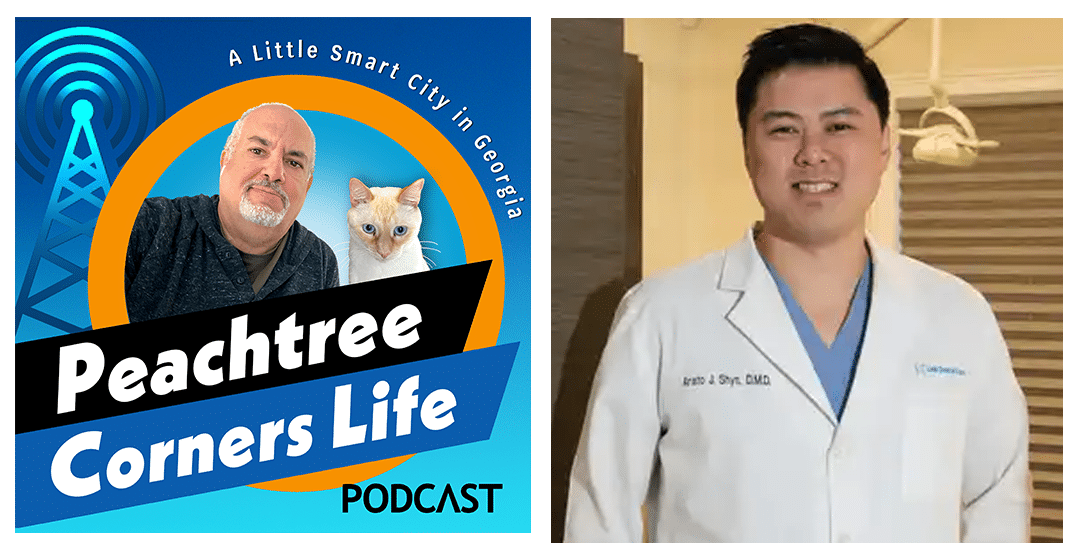
On this episode of Peachtree Corners Life, host Rico Figliolini sits down with Dr. Aristo Shyn, owner of Link Dental Care, to discuss his journey from corporate dentistry to running a thriving private practice. Dr. Shyn shares insights on the challenges of entrepreneurship, how he built a patient-centric practice, and how technology is transforming modern dentistry.
They also dive into Link Dental Care’s community involvement, the role of social media in business growth, and the importance of creating an exceptional patient experience. Whether you’re interested in dentistry, business ownership, or local community impact, this conversation offers valuable takeaways.
Key Takeaways & Highlights:
- From Corporate to Private Practice – Why Dr. Shyn left corporate dentistry to build his own patient-focused practice.
- The Power of Technology in Dentistry – How 3D imaging, digital scans, and upcoming Botox treatments improve patient care.
- Growing a Business – The challenges of launching and expanding a dental office without prior business experience.
- Community Involvement – Supporting local schools, charities, and offering free dental makeovers.
- Navigating Insurance & Patient Care – Why transparency in billing is crucial in healthcare.
- The Role of Social Media – How Link Dental Care’s Instagram skits helped grow their brand and even go viral.
- Balancing Work & Family – Juggling a growing business while raising two kids.
- Future Plans – Potential expansion, but always staying patient-centered under one roof.
Listen in to learn how Dr. Shyn built a thriving dental practice while prioritizing technology, patient experience, and community engagement!
Transcript:
00:00:32 – Rico Figliolini
Hey, everyone. This is Rico of Figliolini, host of Peachtree Corners Life here in the city of Peachtree Corners, Gwinnett County, just north of Atlanta. We have a great guest here today, Dr. Aristo Shyn, who owns Link Dental Care. Thank you for allowing us to do the podcast with you today.
00:00:48 – Aristo Shyn
Thank you for having us. I’ve been calling you our very own Joe Rogan for years now, so it’s an honor.
00:00:54 – Rico Figliolini
I’ve done over 250 episodes. I feel like I could be Joe Rogan. I get the head for it. Before we get into the show, though, let me say thanks to our sponsors. We have two. EV Remodeling, Inc., and Eli, who owns it, that lives here in Peachtree Corners. Great family. They do great work. They do design to build, whole house renovation, or your bathroom, your kitchen, or an addition to the house, whatever you need. They’ve done over 260 homes throughout the metro area. I think you should check them out. EVRemodelingInc.com is where you can find that. Vox Pop Uli, our second sponsor, is also here in Peachtree Corners, also family owned. So they take your brand and they bring it to life. So think about it. You have a brand, you have a car, vehicle. They do, I think this past year, they did over 1,600 vehicle wraps alone. You go to trade shows, they’ll put up a whole setup for you. You need shirts, they’ll do that for you. You need just one or you need 1,000, they’ll do all that for you. If you have a logo and you want to imprint it on an object, bring it to them. Challenge them. It’s amazing what they’ve done. So check them out. Vox Pop Uli is the company, and we appreciate the sponsorship of these podcasts, the magazines, and our journalism. Now that we’ve done the sponsors, I appreciate the conversation we’re going to have today. Aristo’s been, Dr. Shyn has been our family dentist for quite a while for all my kids and my wife and myself. So seeing you guys grow from a very small office that was probably big enough for you when you started.
00:03:06 – Aristo Shyn
Yeah, you’ve been with us since the beginning. Yeah, very humble beginnings.
00:03:09 – Rico Figliolini
So just moving from that, I saw you know you guys were getting more and more patients. The place was getting filled and now you’re in a larger location, a very beautiful place here right on Jimmy Carter Boulevard, Holcomb Bridge Road here. So tell us a little bit about your origins, where you started.
00:03:28 – Aristo Shyn
How far back do you want me to go?
00:03:30 – Rico Figliolini
Where were you born?
00:03:33 – Aristo Shyn
So I was born in Kansas City, Missouri, next to UMKC, which is where my dad went to dental school. And then moved to Alaska afterwards. Stayed in Alaska from ages 2 to 14. And then I moved to Florida, pursued a golf career, and then naturally transitioned to dentistry after that.
00:03:57 – Rico Figliolini
Naturally.
00:03:58 – Aristo Shyn
Yes. And then I’ve been in Georgia since 2012.
00:04:01 – Rico Figliolini
That’s amazing. You went from Missouri, where I’ve never been. I’m a Brooklyn kid. Kid. No longer a kid, but from Brooklyn. So I don’t know that place. Alaska, which is, for me, you know, grizzly bears is what I think of. So you went, right? From grizzly bears, snowstorms, to Florida, alligators, rocks, and hurricanes. And now Atlanta, of which you find almost none of that, actually.
00:04:25 – Aristo Shyn
It’s nice.
00:04:27 – Rico Figliolini
Yeah, it must be different, right? But you went to start with a golf career. When did that even take hold?
00:04:40 – Aristo Shyn
In Alaska, of all places. Yeah, I was pretty good at it. Again, we moved to Florida to pursue that, but I think dentistry was my true calling, and I think I made the right choice.
00:04:55 – Rico Figliolini
Well, and you were kind of young too, I think, when you got your dental degree?
00:05:00 – Aristo Shyn
Yes. I try not to talk about that too much, but I was 23 when I graduated.
00:05:07 – Rico Figliolini
I saw that. I was like, that’s amazing. And so you’ve been practicing since then, obviously.
00:05:10 – Aristo Shyn
Mm-hmm.
00:05:13 – Rico Figliolini
Yeah. So you’re in Atlanta. You moved here in 2012. You decided to start your business in less than a year of moving here.
00:05:23 – Aristo Shyn
Yeah, I think my first job in Atlanta was a corporate job. It wasn’t for me, to say the least. I think I lasted about seven months before saying, I got to do this. I got to do something else. I got to do this on my own. And that’s how I came to Peachtree Corners.
00:05:45 – Rico Figliolini
So just to be clear for people to know, it’s corporate dentistry is what you were working at. So corporate environment with multiple offices and stuff is a whole different business model, I think. Isn’t it?
00:06:02 – Aristo Shyn
Yes, to say the least.
00:06:08 – Rico Figliolini
Yes. You might not want to say it, but I’ll say it. Corporate dentistry is not that great. When you don’t have an owner that owns the business and doing the work that’s passionate about his patients and his community, it’s way different than dealing with someone that’s billing out of Texas let’s say or they have multiple 20, 30, or 90 offices throughout the country. And they sound like they’re local because they sort of keep the name of the place so they sound local but they’re really not. And so they’re driven by money because they have a big nut to pay.
00:06:36 – Aristo Shyn
Yeah, you’re just trying to get me into trouble right now.
00:06:39 – No, no, I’m saying it so it’s okay.
00:06:42 – Aristo Shyn
Listen, I would, in general, and this is from my own experience and what my colleagues have experienced as well, it’s just a lot of, and I think there are good dentists there, but unfortunately they don’t have the autonomy or the control over the whole operation. So I would say a lot of corporate offices, a lot of chain offices, are profit and production driven versus being patient-centric.
00:07:02 – Rico Figliolini
Yeah, I can’t argue with that.
00:07:05 – Aristo Shyn
Yeah, I mean, for example, and this you’ll find often in the industry, when you have your morning huddles, a lot of times at those offices, you’re looking at the schedule for that day. And if there’s not enough production on the schedule, you have to find crowns or implants somehow. And I’ll let our audience use their own imagination for that one. But when we have our meetings, we don’t really talk about that. And we talk about how to streamline logistics and how to improve the patient experience. And these days, fortunately or unfortunately, we’ve been doing some Instagram skits. I’ve been putting my staff through a whole other level of stress.
00:07:58 – Rico Figliolini
You all have to visit the Instagram channel that he has. He comes up with all the skits himself. Some of them are really cool. They’re all pretty good. I mean, some of them are hilarious.
00:08:09 – Aristo Shyn
Yeah, we really, you would expect, you know, before and after photos or us selling something. But I think we’re just trying to have fun there. I really don’t know what we’re selling, but it’s fun. I think it still gives us exposure in a different way. We have a live follower counter there. We’re trying to get that up right now. So follow us, please.
00:08:27 – Rico Figliolini
What is the Instagram? It’s Link Dental Care.
00:08:30 – Aristo Shyn
It’s @LinkDentalCare.
00:08:32 – There you go. So follow them. They want to hit 1,000, like, you know, soon. But no, I think that’s a great team building to be able to do that. There’s a lot of pressure sometimes in doing work and such, and every day is different. I think we would talk before a little bit about how you, you know, you go from one patient speaking English, let’s say, to another patient and speaking Spanish or maybe Korean. So multiple languages here in the office, and multiple challenges, dental challenges, right?
00:09:06 – Aristo Shyn
Yeah. I mean, due to the range of services that we offer from fillings, crowns, to root canals, implant surgeries, sinus surgeries, we get quite the variety of cases here. And then there are days where in one room I’m speaking obviously English, and then next room, I’m speaking Spanish. The other room, I’m speaking Korean. And I think we did a count earlier. We speak a total of nine different languages in this office.
00:09:38 – Rico Figliolini
It’s amazing that you speak three languages, at least.
00:09:43 – Aristo Shyn
Two and a half. We’ll call it three.
00:09:43 – Rico Figliolini
Okay. You get by on it. That’s good. So busy, busy work. Technology, though, drives a lot of dental practices now, too. So tell us a little bit about some of the technological improvements you’ve made here. Some of the technology you’ve brought in.
00:10:01 – Aristo Shyn
Well, everything’s new here. So it’s all digital. All new x-ray units, we have our 3D cone beam imaging machine, we have a 3D scanner, we’re doing really cool stuff with digital photography not just for before and after cases but also to communicate with our lab. We’re doing botox and dermal fillers soon. Busy.
00:10:29 – Rico Figliolini
Yeah, that’s amazing. Botox. How does that work in dental?
00:10:34 – Aristo Shyn
I think it’s been requested quite a bit. We haven’t started it yet. We will very soon. It’s not just for, I don’t think it’s just for cosmetics, but it can do a lot with TMJ and related issues.
00:10:51 – Rico Figliolini
Now, when you started on Peachtree Park, it was just you. I think your mom was helping at the front desk.
00:10:55 – Aristo Shyn
No, she wasn’t there at the time.
00:10:57 – Rico Figliolini
She wasn’t there. She came later, maybe.
00:11:01 – Aristo Shyn
Yeah. It was, I think it was a thousand square feet. I don’t think anything was digital at the time. And I had, it was me, one and a half hygienists, one assistant, and one person in the front. Yeah, I still remember I could actually stand in the middle of the office, and if I did a 360, I could see everything. The front office, the four chairs, the lab.
00:11:23 – Rico Figliolini
Yes, I was just thinking the same thing. That’s how small this place was. How many square feet is this place?
00:11:33 – Aristo Shyn
I think it’s just over 3,000.
00:11:38 – Rico Figliolini
And you took on a new, also an additional practitioner with you as well?
00:11:41 – Aristo Shyn
Oh, yeah. New staff, front offices, expanded assistants, hygienists. Another doctor. I mean, she’s been terrific.
00:11:42 – Rico Figliolini
Dr. K?.
00:11:51 – Aristo Shyn
Yep. Dr. K.
00:11:52 – Rico Figliolini
So business has been going well. So that’s good, no?
00:11:54 – Aristo Shyn
It’s been busy. It’s been busy.
00:12:00 – Rico Figliolini
Can’t complain. And there are challenges, right? So let’s go back a little bit. Challenges of opening a business. What would you say to an entrepreneur, to another dentist that wanted to do the same thing? What challenges did you have to overcome when you did that?
00:12:16 – Aristo Shyn
When we first started everything I mean, I was still learning. I had no business experience, I had no HR experience. I mean, I was still learning dentistry at the time so you know the normal course for I’d say acquiring a dental office is, you know you’re usually out in the field for a few years and then you kind of pick up on things and you know slowly transition. But everything happened at once for me so I don’t recommend you do that because it’s quite the learning curve. But going back to everyday challenges, though, I would say half of my stress is just due to my staff, which I love very much, who I love very much. I think we have the best staff ever right now, but you’ve got to deal with staff every single day. So there’s always something. And then beyond that, it’s insurance. Insurance is an issue for, I think, everyone involved in the insurance game. And then after that, it’s just dealing with a wide range of patients and cases that we have coming in, which is also fun for me. But there’s also some focus and stress, and we’re always on our toes. So there’s that aspect to it.
00:13:35 – Rico Figliolini
I think part of that stress probably is because you’re, of your concern for your patients and stuff. I mean you’re sharing that stress with them right? Because some of them, because like you said insurance can be an issue. You know they come in they have to do certain things insurance may or may not cover it or you know, yeah. I mean so, has that changed in the state of Georgia a lot over the past decade?
00:14:01 – Aristo Shyn
I don’t know, insurance is kind of like a foreign language to me. We try our very best to be transparent with everything, I mean not just in my communication with our patients but also you know with our front desk communicating you know regarding finances and numbers. But you know, we try our best, that’s all I can say.
00:14:19 – Rico Figliolini
No that’s good. That you know, I mean that’s the toughest part I think when it comes to medical.
00:14:23 – Aristo Shyn
And our front desk goes to bat for patients if there’s any issues with insurance we don’t just give up and you know tell them that it’s on them so yeah. I know my front desk works very hard.
00:14:36 – Rico Figliolini
Okay cool. You know, the care that you show into the community as well, right? You’re involved with the community. So let’s cover that a little bit as well. What do you like doing in the community? What have you done? Where has Link Dental Care been involved in when it comes to community organizations, events and stuff?
00:14:55 – Aristo Shyn
Well, it’s very different now than when I first started. And I’m very happy and proud of where we are today. For example, I mean, even last year we were able to sponsor the Norcross High School Marching Band, local photography club. I’ve worked closely with Norcross Co-op for quite some years. And it’s, you know, when we interview for dental school, you know, one thing that we’re always saying is we want to be part of the community. We want to be involved in the community. And, you know, that wasn’t the case when we first started. Now that we’re here. Yeah, I plan on staying here and being more involved as time goes on.
00:15:37 – Rico Figliolini
That’s cool. You know, I mean, the biggest thing that we do at the magazine and stuff is that we like to be a cheerleader for businesses that are giving back to the community, doing things with the community, especially if you’re pulling from this community. You know, your patients, your customers, and all that. So being involved makes sense.
00:15:57 – Aristo Shyn
Yeah. And I think we’ve done quite a bit of charity over the years. We don’t advertise it or we don’t really post a whole lot of it on social media. But outside of working at volunteer clinics, we try to take on at least one patient a year and give them a makeover, which they wouldn’t have been able to get otherwise. That’s something I’ve been doing.
00:16:21 – Rico Figliolini
That’s cool. That’s great that you’re able to do that. When the business gets to a certain point, and you’re facing these everyday challenges, right? At the end of the day, what do you do to release that stress, that pressure? I mean, what do you do outside of the office? You’re not playing golf anymore.
00:16:53 – Aristo Shyn
No, it takes too much time.
00:16:54 – Rico Figliolini
Do you get out of the office? What time do you close up?
00:16:57 – Aristo Shyn
Well, it’s a good thing I still like what I’m doing. But yeah, life’s gotten busy. So the way I see it, I mean, I do have a few hobbies, but really it’s been work and my kids right now. So when I’m working, the way I see it, it’s overtime in a football, basketball scene. And then when I’m with my kids, it’s game seven, triple overtime. So that’s where all my focus has been after work.
00:17:28 – Rico Figliolini
Sure, sure. You have two kids, I think? Two kids. Good-looking kids. So, you know, you’re expanding. You’ve done your expansion. But there’s a future, right? I know you want to stay here. You want to expand. What does the future look like for Link Dental Care? For you?
00:17:44 – Aristo Shyn
We just moved in here. We’re talking about expansion again.
00:17:47 – Rico Figliolini
Are you really? You just moved in here. How long has it been? It’s been a few years. Can’t you stop?
00:17:58 – Aristo Shyn
I mean, a few. I mean, patients and staff have asked me in the past, what do I plan to do? Do I plan on opening multiple offices or another location? And to answer one part of that question, I think when a dentist branches out to two, three, four offices, there comes a point where you’ve got to stop being a dentist and become more of a businessman. And I still like what I’m doing a lot. And I really want to keep our practice patient-centric and really emphasize that we are a people business, not a tooth-cutting business or a production business. But, you know, I definitely plan on staying in Peachtree Corners. We’re not leaving. I mean, if there ever is another expansion, you can rest assured it’ll still be under one roof. That’s been always important to me. And I mean, going forward though, I think we’re just, we’re going to continue doing what we’ve been doing. We’re going to continue to stay up with technology, continue to reinvest in the office and the community.
00:19:19 – Rico Figliolini
Okay. Yeah. Sounds good. This is a great place. People want to take the tour. I mean, 3,000 square feet is a lot of space. I think you have plenty of space to expand in. What should people know about you maybe that they don’t know? Is there anything interesting that you want to share?
00:19:41 – Aristo Shyn
I can share what our dental practice focuses on. I think a lot of times patients and dentists alike, they emphasize, they put their emphasis a lot on good dental care. And that is absolutely important. But, you know, to us, you know, good dental care alone doesn’t really, it doesn’t always equate to a good patient experience. And I care a lot about the patient experience. So that means the patient experience starts from the first time you call into our office, from the time you walk through our doors the first time. From the way you’re greeted from the front office, from the way, you know, our assistants or hygienists take you back to the clinical area. So, you know, bedside manners and having clear communication. So, you know, when you’ve put in all those factors, you know, the receiving good dental care, although quite important, it’s not the only piece to the puzzle. So that’s been my focus.
00:20:48 – Rico Figliolini
Cool. Patient-centric, essentially. Well, we’ve been speaking to Dr. Aristo Shyn. It’s a great practice, you guys have. I’m glad that he’s my dentist also, my family dentist. He has been doing a great job. So I appreciate you giving us some time and telling us a bit about your business.
00:21:06 – Aristo Shyn
Thank you.
00:21:07 – Rico Figliolini
Thank you. Everyone, if you have any questions, you can actually check out the website, which is?
00:21:13 – Aristo Shyn
LinkDentalCare.com. There you go.
00:21:15 – Rico Figliolini
And Instagram, it’s the same handle, @LinkDentalCare, right? Anything else you want to share? Count is 455, so we need to get that up to 1,000 apparently.
00:21:25 – Aristo Shyn
It was 200 a few months ago. I’ll tell you one more thing about Instagram before we end this. Within a couple months of us actually trying on Instagram, we actually went viral on one video. We got 1.3 million views.
00:21:41 – Rico Figliolini
Damn, which video was that one?
00:21:43 – Aristo Shyn
That was last year. It was the one about our 3D scanner. So I thought I figured it out and I was almost ready not to come into work the next day. And then here I am doing a podcast with Rico.
00:21:57 – Rico Figliolini
Sorry, it’s not a YouTube content or TikTok creator yet, but he’ll get there soon. Thanks everyone. If you have any questions, leave them in the comments. Of course, we’ll have links in the show note and you can always find Dr. Aristo Shyn here at Link Dental Care. So thanks again, everyone. Take care.
Related
Read the Digital Edition
Subscribe
Keep Up With Peachtree Corners News
Join our mailing list to receive the latest news and updates from our team.
You have Successfully Subscribed!

Expanding Horizons: How KGM Technologies Balances Defense, Medical, and Precision Manufacturing

Why Patient Experience Matters: A Conversation with Dr. Aristo Shyn

Our Growing Deer Population: What to Do?

Inside the Solicitor General’s Office: Lisamarie Bristol on Justice in Gwinnett County

Public Notice: Scheduled Maintenance on Town Center Parking Deck

Mike Schleifer to Leave Alliance for Lincoln Center Theater

Holy Week, Easter Sunday and Church Events in April

Peachtree Corners Business Shines on “The Blox”

Peachtree Corners Business Shines on “The Blox”

Our Growing Deer Population: What to Do?

Holy Week, Easter Sunday and Church Events in April

Expanding Horizons: How KGM Technologies Balances Defense, Medical, and Precision Manufacturing

Mike Schleifer to Leave Alliance for Lincoln Center Theater

Public Notice: Scheduled Maintenance on Town Center Parking Deck

Inside the Solicitor General’s Office: Lisamarie Bristol on Justice in Gwinnett County

Why Patient Experience Matters: A Conversation with Dr. Aristo Shyn

Light up the Corners [Video]

Capitalist Sage: Business Leadership in Your Community [Podcast]

Cliff Bramble: A Culinary Adventure through Italy

Top 10 Brunch Places in Gwinnett County

A Hunger for Hospitality

THE CORNERS EPISODE 3 – BLAXICAN PART 1

Top 10 Indoor Things To Do This Winter

The ED Hour: What it takes to Remove Barriers from Education





